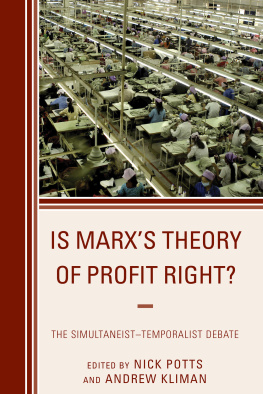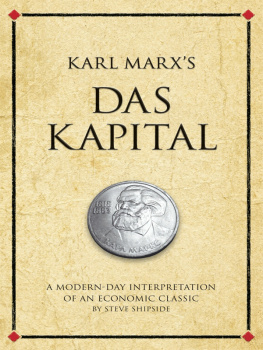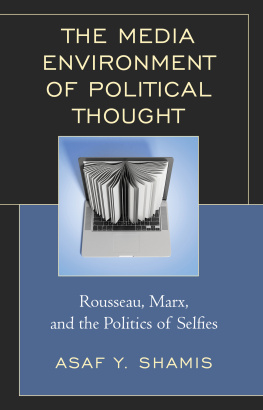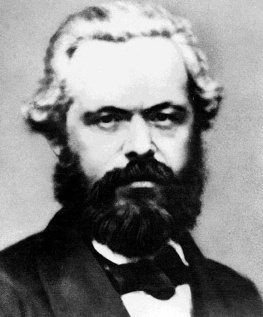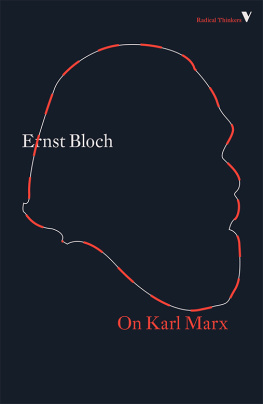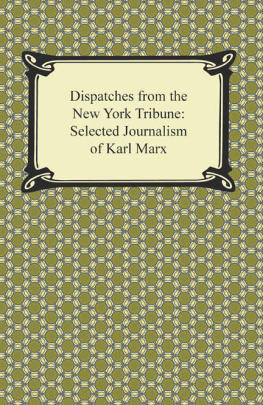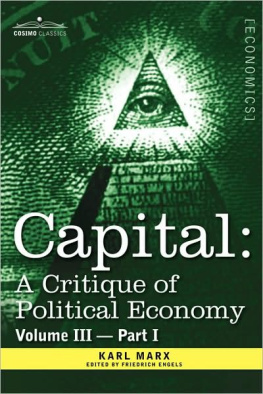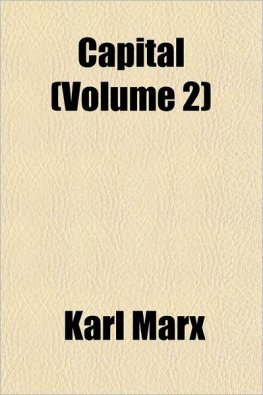Marx Karl - Selected Essays
Here you can read online Marx Karl - Selected Essays full text of the book (entire story) in english for free. Download pdf and epub, get meaning, cover and reviews about this ebook. genre: Science. Description of the work, (preface) as well as reviews are available. Best literature library LitArk.com created for fans of good reading and offers a wide selection of genres:
Romance novel
Science fiction
Adventure
Detective
Science
History
Home and family
Prose
Art
Politics
Computer
Non-fiction
Religion
Business
Children
Humor
Choose a favorite category and find really read worthwhile books. Enjoy immersion in the world of imagination, feel the emotions of the characters or learn something new for yourself, make an fascinating discovery.
Selected Essays: summary, description and annotation
We offer to read an annotation, description, summary or preface (depends on what the author of the book "Selected Essays" wrote himself). If you haven't found the necessary information about the book — write in the comments, we will try to find it.
Selected Essays — read online for free the complete book (whole text) full work
Below is the text of the book, divided by pages. System saving the place of the last page read, allows you to conveniently read the book "Selected Essays" online for free, without having to search again every time where you left off. Put a bookmark, and you can go to the page where you finished reading at any time.
Font size:
Interval:
Bookmark:
The Project Gutenberg EBook of Selected Essays, by Karl Marx
This eBook is for the use of anyone anywhere at no cost and with
almost no restrictions whatsoever. You may copy it, give it away or
re-use it under the terms of the Project Gutenberg License included
with this eBook or online at www.gutenberg.org
Title: Selected Essays
Author: Karl Marx
Translator: H. J. Stenning
Release Date: May 22, 2007 [EBook #21565]
Language: English
*** START OF THIS PROJECT GUTENBERG EBOOK SELECTED ESSAYS ***
Produced by Fritz Ohrenschall, Jeannie Howse and the Online
Distributed Proofreading Team at http://www.pgdp.net
Transcriber's Note:
Obvious typographical errors have been corrected in this text.
For a complete list, please see the end of this document.
ESSAYS
Essay Index Reprint Series
FREEPORT, NEW YORK
Reprinted 1968
68-16955
The present volume consists of a translation of some of Karl Marx's principal writings during the six years 1844-1850.
In 1843 Marx was twenty-five years old. He had just married, apparently on the strength of the modest salary he was to receive for editing, jointly with Arnold Ruge, a periodical called the Deutsch-Franzsische Jahrbcher (Franco-German Annuals), the purpose of which was to promote the union of German philosophy with French social science. Only one double-number of this journal appeared in 1844. It contained Marx's criticism of the Hegelian Philosophy of Right and his exposition of the social significance of the Jewish question, in the form of a review of two works by Bruno Bauer.
Translations of both articles are given in this volume.
They possess a special interest for the Marxian student, as they exhibit the grafting of a materialist philosophy upon the idealist philosophy of Hegel, and show the employment of the Hegelian dialectic in the investigation of political and historical questions.
It was not long before Marx and Ruge became intellectually estranged, and the third essay, "The King of Prussia and Social Reform," which appeared in the Paris socialist journal Vorwrts, contains a severe polemic against Ruge. In the same organ Marx published an elaborate defence of Engels in particular and communists in general from the strictures of Karl Heinzen, a radical republican politician. In both essays Marx ranges over a wide field, and develops his own views upon economic, political and historical questions.
The essay on Proudhon emphasizes the special merits of that writer as a pioneer of economic criticism, and forms a counterweight to Marx's devastating criticism of Proudhon in the "Poverty of Philosophy." This piece and the sketch of French materialism are extracted from Die Heilige Familie (The Holy Family), a comprehensive work of satirical criticism, in which Marx and Engels (whose share in writing the book was a very small one), settled accounts with their philosophic conscience.
The critique of the views of M. Guizot upon the English and French middle-class revolutions appeared in the Neue Rhenische Revue (New Rhenish Review), a periodical which Marx and Engels edited from London in 1850.
H.J.S.
| PAGE | |
| A CRITICISM OF THE HEGELIAN PHILOSOPHY OF RIGHT | 11 |
| ON THE JEWISH QUESTION | 40 |
| ON THE KING OF PRUSSIA AND SOCIAL REFORM | 98 |
| MORALISING CRITICISM AND CRITICAL MORALITY: A POLEMIC AGAINST KARL HEINZEN | 134 |
| PROUDHON | 171 |
| FRENCH MATERIALISM | 180 |
| THE ENGLISH REVOLUTION | 196 |
As far as Germany is concerned the criticism of religion is practically completed, and the criticism of religion is the basis of all criticism.
The profane existence of error is threatened when its heavenly oratio pro aris et focis[1] has been refuted.
He who has only found a reflexion of himself in the fantastic reality of heaven where he looked for a superman, will no longer be willing to find only the semblance of himself, only the sub-human, where he seeks and ought to find his own reality.
The foundation of the criticism of religion is: Man makes religion, religion does not make man. Religion indeed is man's self-consciousness and self-estimation while he has not found his feet in the universe. But Man is no abstract being, squatting outside the world. Man is the world of men, the State, society. This State, this society produces religion, which is an inverted world-consciousness, because they are an inverted world. Religion is the general theory of this world, its encyclopdic compendium, its logic in popular form, its spiritualistic Point d'honneur, its enthusiasm, its moral sanction, its solemn complement, its general basis of consolation and justification. It is the fantastic realization of the human being, inasmuch as the human being possesses no true reality. The struggle against religion is therefore indirectly the struggle against that world whose spiritual aroma is religion.
Religious misery is in one mouth the expression of real misery, and in another is a protestation against real misery. Religion is the moan of the oppressed creature, the sentiment of a heartless world, as it is the spirit of spiritless conditions. It is the opium of the people.
The abolition of religion, as the illusory happiness of the people, is the demand for their real happiness. The demand to abandon the illusions about their condition is a demand to abandon a condition which requires illusions. The criticism of religion therefore contains potentially the criticism of the Vale of Tears whose aureole is religion.
Criticism has plucked the imaginary flowers which adorned the chain, not that man should wear his fetters denuded of fanciful embellishment, but that he should throw off the chain, and break the living flower.
The criticism of religion disillusions man, so that he thinks, acts, shapes his reality like the disillusioned man come to his senses, so that he revolves around himself, and thus around his real sun. Religion is but the illusory sun which revolves around man, so long as he does not revolve around himself.
It is therefore the task of history, once the thither side of truth has vanished, to establish the truth of the hither side.
The immediate task of philosophy, when enlisted in the service of history, is to unmask human self-alienation in its unholy shape, now that it has been unmasked in its holy shape. Thus the criticism of heaven transforms itself into the criticism of earth, the criticism of religion into the criticism of right, and the criticism of theology into the criticism of politics.
The following essaya contribution to this workis in the first place joined not to the original, but to a copy, to the German philosophy of politics and of right, for no other reason than because it pertains to Germany.
If one should desire to strike a point of contact with the German status quo, albeit in the only appropriate way, which is negatively, the result would ever remain an anachronism. Even the denial of our political present is already a dust-covered fact in the historical lumber room of modern nations. If I deny the powdered wig, I still have to deal with unpowdered wigs. If I deny the German conditions of 1843, I stand, according to French chronology, scarcely in the year 1789, let alone in the focus of the present.
Font size:
Interval:
Bookmark:
Similar books «Selected Essays»
Look at similar books to Selected Essays. We have selected literature similar in name and meaning in the hope of providing readers with more options to find new, interesting, not yet read works.
Discussion, reviews of the book Selected Essays and just readers' own opinions. Leave your comments, write what you think about the work, its meaning or the main characters. Specify what exactly you liked and what you didn't like, and why you think so.


